The Sunhill Sanatorium belonged to a company. It consisted of Doctor Sally Bottle and a handful of nonentities who gave sums of money to Dr. Bottle to turn over for them.
Doctor Sally Bottle was as omnipotent in the company as she was omnipotent in the San. She rushed down from her Harley Street office late Friday night and took hold, returning to London late Sunday night. Doctor Sally filled not only the San with herself. She filled every corner of the property—a large acreage. Dining-room, kitchen, garden, fields, home-farm, even the tiny morgue, where they hid away the dead that we were supposed to know nothing about—Doctor Sally Bottle dominated all.
They gave us very little credit for having sense in Sunhill. We came here to pause our ordinary activities. Even thinking was prohibited. Doctor Bottle’s brain worked for all the fifty patients and even for Donkey Jinny who mowed the lawns of Sunhill, her feet laced into two pair of human boots. It was Dr. Bottle’s command that Jinny wear boots, an indignity to Jinny’s dainty hooves. Jinny invariably gave a derisive bawl when the meek greys plodded up the driveway with Doctor Sally behind them in the horseshoe bus. Jinny was the only creature who dared voice a come-back at Doctor Bottle.
During her visit the oversize resident Doctor shrivelled. To the naked eye Doctor McNair was a vast woman. Her bulk was only flesh and blood; her voice was thin and meek, her decisions wavery, her eye unobservant. She was pompous and over-masterful to the staff. When she was in charge, she wished it remembered that in Doctor Bottle’s absence she was official head. Among the patients she showed favouritism. (I happened to be one of her favourites so I do not say this for spite.) It rather amused us to see Dr. Mack sink like sediment beneath the swirling ferment of Doctor Bottle’s activity during week-ends.
It was scarcely light on Saturday morning when we heard the procession advance upon the sleepers. The procession started from the Doctor’s office. Windows along the corridors had stood open all night, and were open now to the early morning chill. Dr. Bottle in a stout stuff dress of plum colour buttoned to the chin bustled ahead clap, clap, clap. She had large feet, the kind that slap the floor with every step, iron-grey hair, coarse and smeared back to an onion at the nape of her neck. The wind took liberties with Doctor Sally’s hair, streaming it three or four inches ahead of her face. She was always blowing or pushing it back with hands or lips. Behind Doctor Sally in the procession came Nurse Pickwick, trundling a heavy iron scale on wheels—the kind of scale butchers use to weigh carcasses. Doctor McNair, meek-voiced, long-legged, clasping the Doom Book in both hands, tailed the lot. The scale halted at each door, stopping with a screech. The door opened, out came a scantily-clad patient, stepped onto the scale’s iron platform, first kicking the woolly shoes from off her feet. Nurse Pickwick adjusted the weights. Doctor Bottle read the tally. Doctor McNair made entry in the Doom Book. If there was no gain the patient slunk back into her room without comment. If there was loss, the Doctors wagged their heads and the victim knew there would be an increase in the size of her helpings at table, vastly oversize now for any normal appetite.
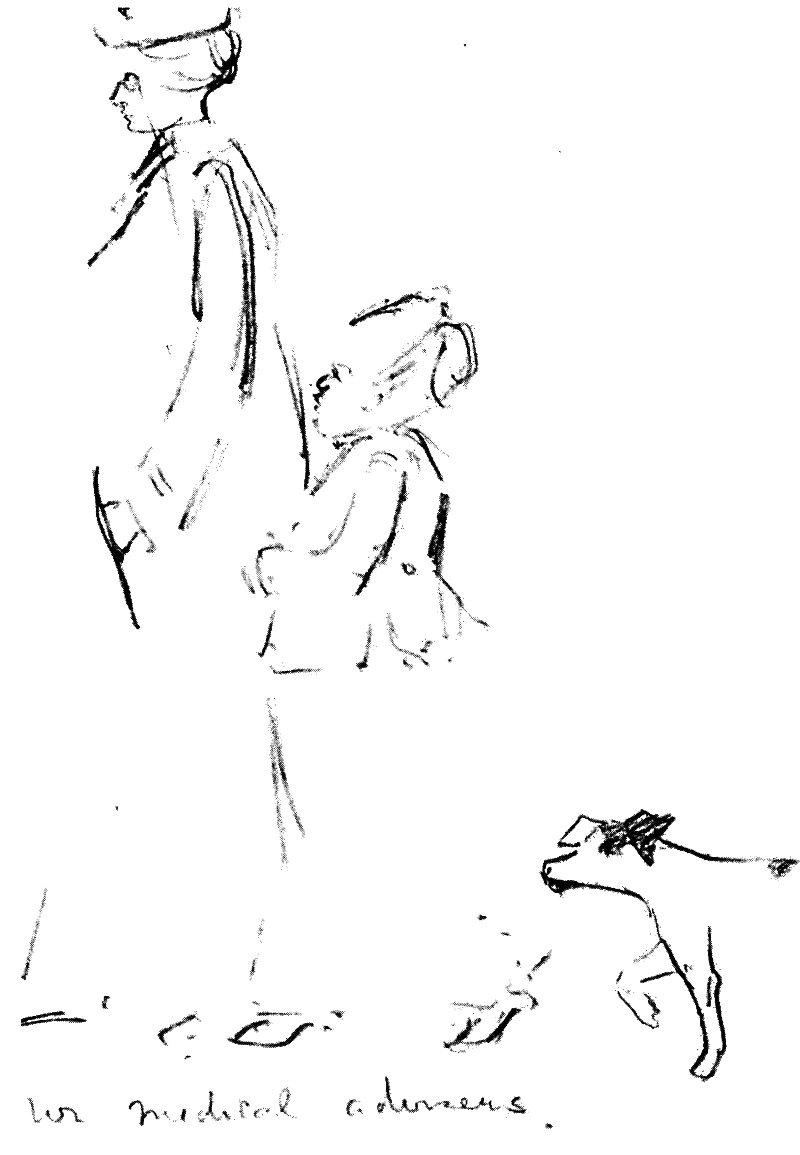
Our Medical Advisers
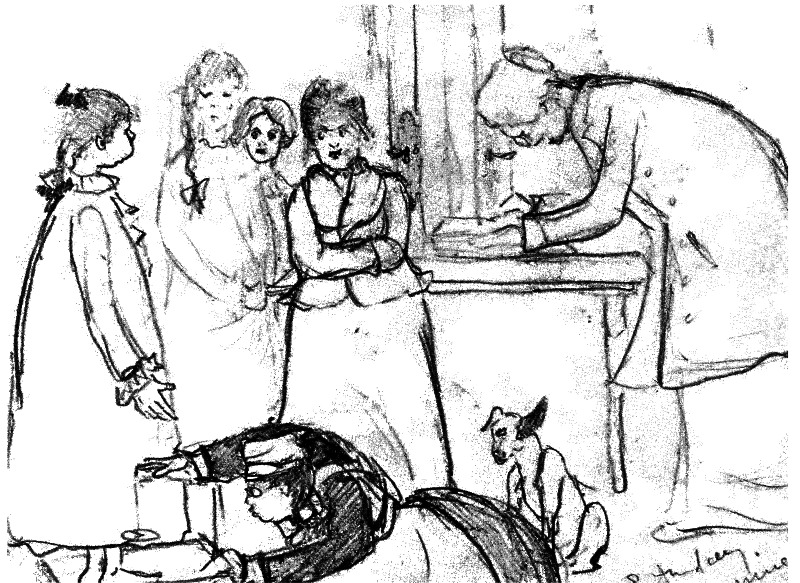
Saturday Morning
Nobody lingered over their dressing in these icy rooms. Through winter’s coldest, her wettest days, only one half-hour of heat was allowed to unchill the registers night and morning against freeze-ups, not to unthaw us. The great dining-room was open to the weather on three sides. I was not permitted to get up for breakfast. All those red noses and purple hands must have looked pitiful. My own meals were moderate enough: I was not T.B., I was not under weight.
Because weighing delayed patients dressing, on Saturday morning they were excused if they were a little late. Immediately after the meal the two Doctors went to the office and hung great stethoscopes like glorified wishbones round their necks. One by one the lung patients submitted to soundings and tappings. From these lung soundings I was exempt, but my heart got them good and plenty later.
Patients were graded as ‘Downs’, ‘Ups’, and ‘Semis’. ‘Downs’ kept their beds; ‘Semis’ spent part of each day lying in a long row of reclining chairs on the Circular Porch, or on the gravelled terrace just below the open fronts of the patients’ rooms; ‘Ups’ had begun to respond to treatment, went to meals in the dining-hall, and took prescribed walks, so many hours (or was it minutes?) to the mile.
The Sanatorium was built in the form of a cross. In the body of the cross were dining-hall, kitchen, offices. To the right and to the left of the body were the long wings two stories high. All the patients’ rooms were under these wings or arms. Between them projected a circular brick-paved porch, as it were the head of the cross. Doctor McNair’s office had a window opening onto the Circular Porch so that serious patients were always under her eye. From her room she could look down the right and left terrace, see the long rows of reclining chairs.
The ‘Ups’ assembled on the Circular Porch to await tea and rest-bell. Twelve to one and five to six were San Rest Hours when every patient lay and was still. From her window the Doctor could time the coming back of each patient from his walk, note if he had over-hurried or dawdled, by timing his arrival on the porch. Everything was horrible clockwork, tick tock, tick tock. You felt like a mechanical toy.
Nothing but cheer was permitted in the corridors. If a patient had a huge misery, knew she must cry, she ran to her room under the San’s long brooding wings, ducked behind her scant dressing screen, gave way. It was more indecent to be seen crying in the San than to be seen naked.
New patients soon caught on to the San code: T.B. taboo, symptoms taboo, grumbling taboo, mention of death taboo of taboos. Of course, there were the few who could and would talk of nothing but themselves and their disease, but they soon discovered they were shunned.
Pickwick, Bandly, Brown, Bunker, Maggy, Ada, and a nondescript creature known as ‘Odd Jobs’—this was the San’s nursing staff, with Specials sent from London when they were required. Old Pickwick was a certified nurse, the rest though apparently in good health were ex-T.B. patients, whose lungs were still owned by Dr. Sally. In return for keep and treatment they nursed under the supervision of Matron Lovat. Nurse Brown was my nurse, a sad prim soul whom I promptly nicknamed Jokey Hokey. At first she protested, because not being trained ‘regulars’ our nurses were more particular than ordinary about professional etiquette. Soon Nurse Brown warmed to my pet name, permitting me to ‘Hokey’ her providing I did not do it in public.
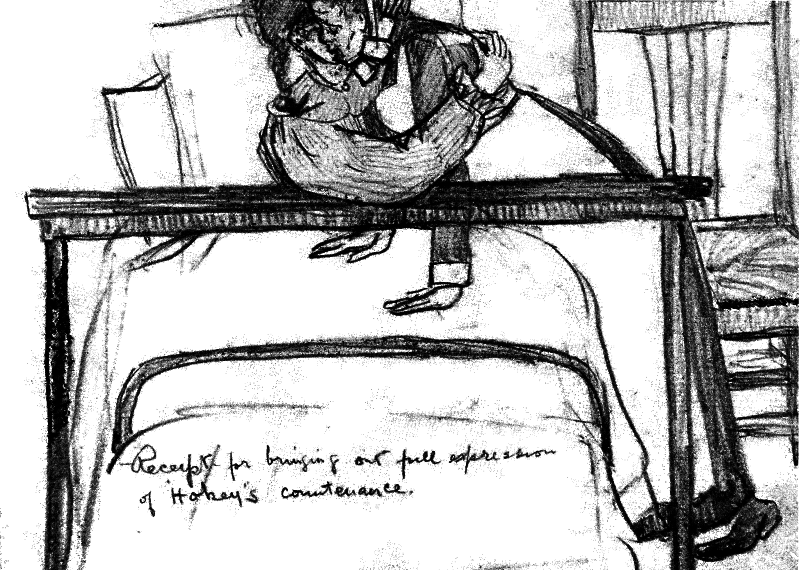
Emily and Hokey
Receipt for bringing out full expression of Hokey’s countenance
I read my own behaviour in Hokey’s face. If I was suffering, it was sad; were I provoking or contemptible, Hokey’s face set like a junket. When I was simply impossible she went away and left me.
A habit that English nurses had, that of calling their patients ‘Dear’ from the moment they came on a case, annoyed me tremendously. Hokey deared me just once.
“Don’t do that to me,” I shouted. “I won’t be ‘Dear’ except to those who mean it and to whom I am dear.” Hokey never deared me again; when I was being dear, though, she would give me one of her rare sweet smiles.
Pickwick because of her certificates was bumptious and unpleasant. Bunker had a puffy face, fallen arches and wheezy breath. Maggy was short, snorty, and religious. She devoted herself to the Cranleigh boy who was very ill. Each nurse had one specially serious case. The ‘Ups’ and the ‘Semis’ did not require much care. Hokey’s bad case was old John Withers.
Last and least of the nurses was Ada the Quakeress, who smashed all my ideas of Quakerism. She burst into the room in a sky-blue dress. All the other nurses wore navy serge, and white caps and aprons. The San was much too cold to wear white starched uniforms. The Quakeress wore this razzle-dazzle blue, was loud of voice, a door banger, a soup slopper. She nipped snacks of food off patient’s trays, and screeched if she saw an insect. The rooms being so open, all sorts of creatures naturally found their way in. I loathed Ada the Quakeress.
Beyond all ranking, at the tail of the list came ‘nondescript’, neither nurse, maid, nor patient. Her neck was a continuation of her lean cheeks; she had no chin, she had sly eyes which skidded. This creature went by the name of ‘Odd Jobs’. The nurses called on her inefficiency for bits of help if they were extra busy.
Under a cheerful crust there was something wistful about our nurses; maybe it was constantly watching the finish of that which tainted their own lives. They could not go in for regular hospital training; most of them knew they were just marking time. When five years later I met an old San patient in Paris and enquired for nurses and patients, one by one, only in an occasional instance would the old San patient say, “He was cured.” It was, “Did you not know T.B. got him in the end?” She told me that the treatment had been very much modified since my San days.
The men patients at Sunhill Sanatorium kept to themselves, enjoying a grouch. They made me think of a little band of ducks in a big hen yard. Someone had advised their seeing the Big Lung Specialist, Sally Bottle of Harley Street. Of course Doctor Sally advised Sunhill San at once. “Just a few weeks in the open air in that lovely part of England, there you were! well again!” She kept them in bed for some weeks, according to the severity of their case. Then they were promoted to ‘Semis’ and put to lie in a lounge chair on the terrace.
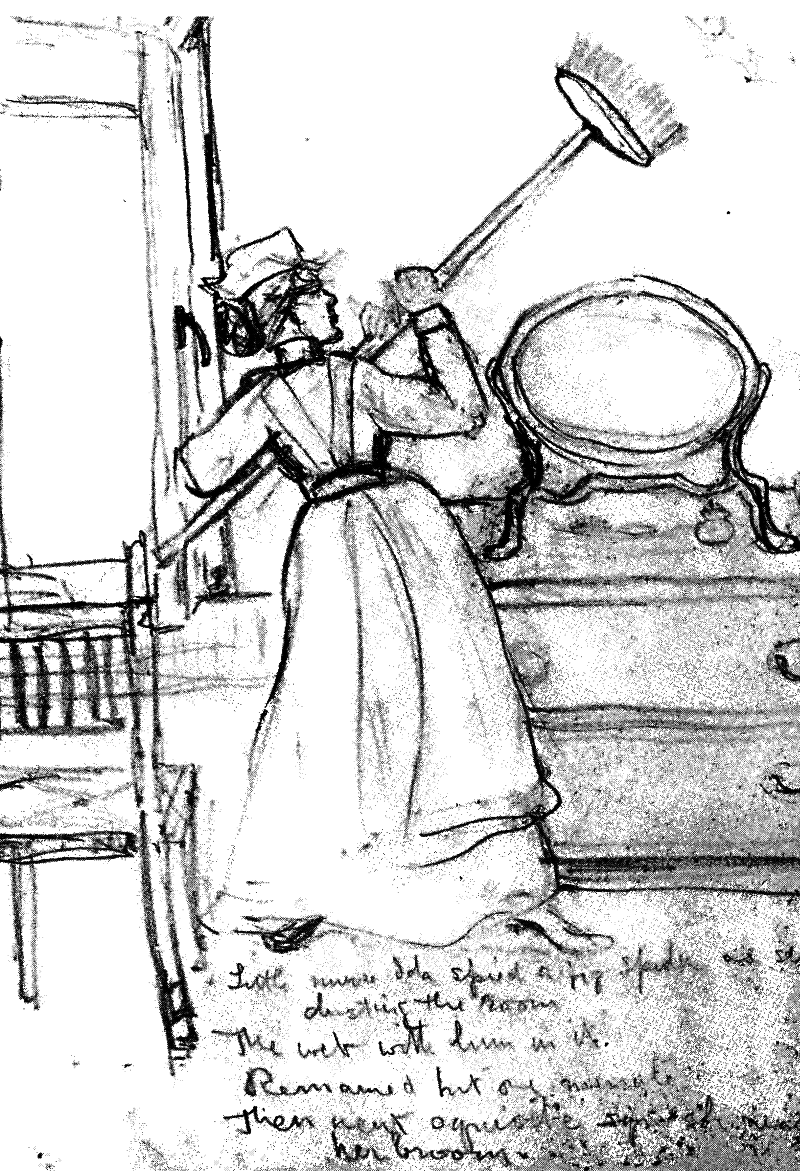
Ada
Little nurse Ida spied a big spider
As she was dusting the room.
The web with him in it
Remained but one minute
Then went squis-it-e, squish, ’neath her broom.
It was then that they found out, and their fury boiled! Twenty women to every man, rows of red-faced woolly-clad women, aggressively cheerful. The men scuttled into being ‘Ups’ with all possible speed, to get away from the women. They grew beards, quit the terrace, herded on the lawn, or walked in an angry group.
The lungs of the ‘Ups’ underwent a thorough overhaul every week. That was the time patients saved for questioning, because during examination doctor and patient necessarily were close. The patient quavered.
“Doctor Bottle when—?”
“Hold your breath.”
“Please, Doctor Bottle—”
“Double over.”
“But, couldn’t you tell me—?”
“Next!”
The questioner had to wait till Rest Hour to try and get a hearing, but Doctor Bottle held the latch of the door in her hand in spite of the draught that nearly blew the hair off her head. “How are you? How are you?” Blithe and without waiting for an answer she was gone. Lung healings are slow. Probably Doctor Bottle did not know herself, but it was disheartening for patients. By and by they stopped asking.
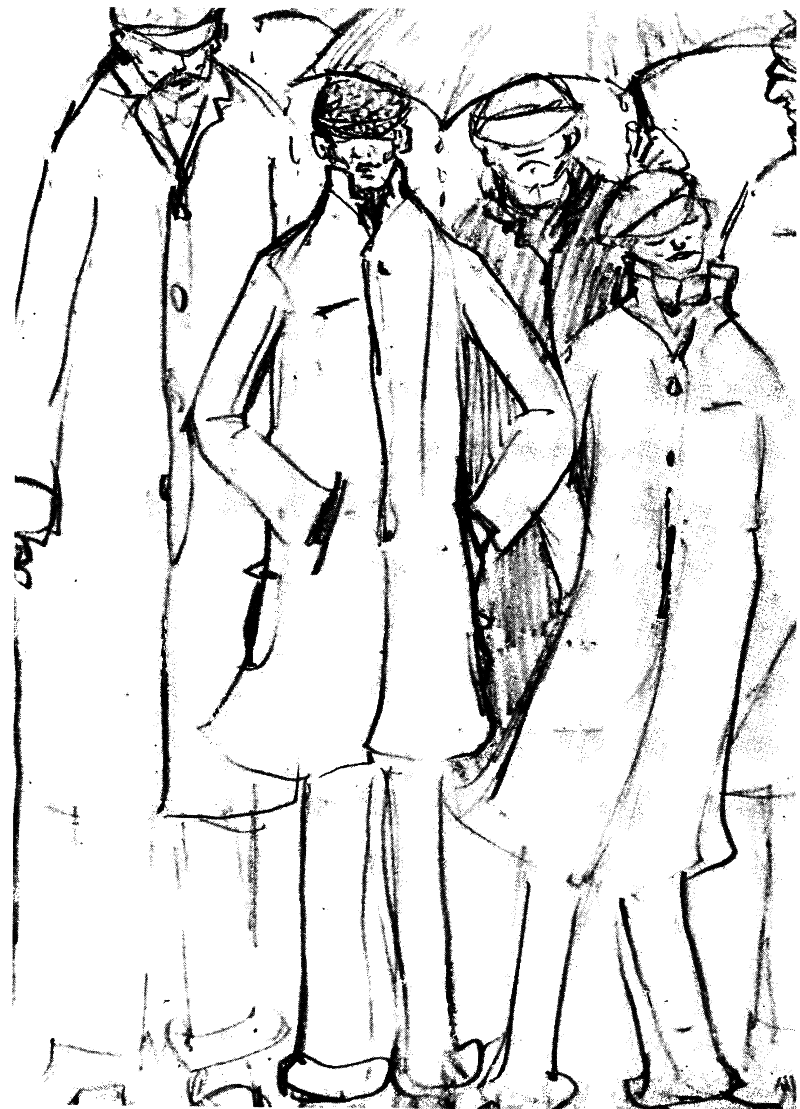
Men
Everyone loved Matron Lovat. She faced things, had the courage of a cook who plunges a clean blade into the middle of her cake to test, rather than nibble round the edges. She was quiet and understanding, had none of that mock cheer the rest of the staff stuck on. We took our minor troubles to Matron. Doctor Mack was jealous, overbearing. She disliked Matron, resentful that we felt the comfort of going to her. The Doctor pushed Matron back into her place. Matron was a fully trained nurse; Doctor was an intern, not as yet a complete doctor. One day Matron came into my room. I said, “Those open ventilators over my head create a perpetual draught, give me neuralgia. Could I have them closed?” Matron shut the ventilators. Doctor Mack strode into the room. “Since when has the Matron taken upon herself to close my patients’ windows?” She snatched the cords, opened the windows with a bang! Matron quietly left the room—a big little lady.
“I will send you something for your neuralgia,” said the big woman, who was small, and hurried down the hall. I heard her overtake Matron, heard Doctor’s dictatorial bluster. Matron said never a word.


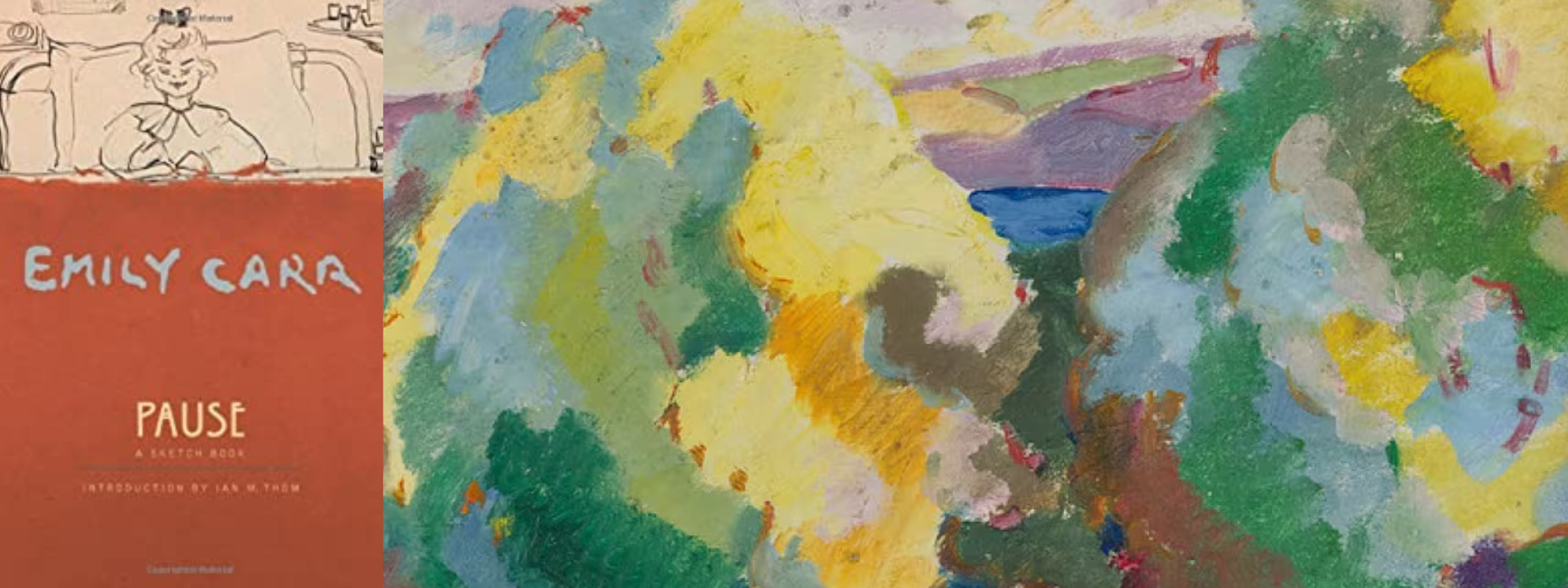

0 comments